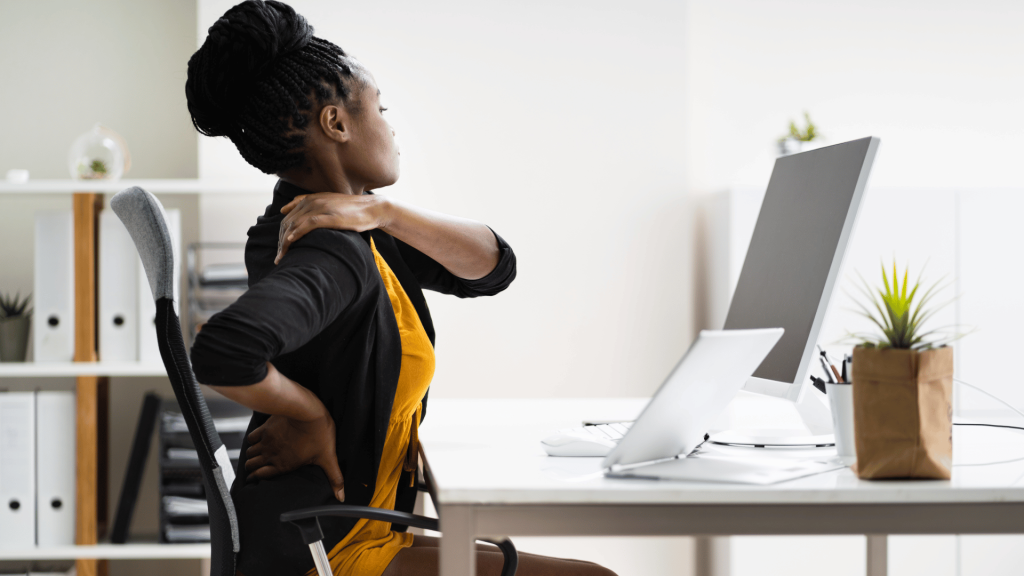GIVE SITTING A BREAK:
A Practical Guide to Incorporating
Movement into Your Day

We use less energy while sitting compared to standing or moving, and research has established a connection between prolonged sitting and various health problems, including obesity and metabolic syndrome, which is characterized by increased blood pressure, high blood sugar, excess body fat around the waist, and unhealthy cholesterol levels. There is also an increased risk of death from cancer and cardiovascular disease associated with excessive sitting and prolonged periods of sitting, such as those spent at a desk, behind a wheel, or in front of a screen. As a result, any extended sitting can be detrimental to health.
A group of researchers examined 13 studies concerning the relationship between sitting time and physical activity levels. Their findings revealed that individuals who spent over eight hours sitting every day without engaging in any physical activity were at a similar risk of death as those who were obese or smoked. Nonetheless, this particular analysis, which involved over one million participants, demonstrated that 60 to 75 minutes of moderately intense physical activity per day could offset the harmful effects of prolonged sitting. Alternatively, other studies have suggested that sitting time has a negligible effect on the mortality risk of individuals who are highly active.

In an initial study that compared transit drivers who sit for most of the day with conductors or security personnel who spend a lot of time on their feet, scientists observed that those who sat were twice as likely to develop heart disease, despite similar lifestyles and diets. Prolonged sitting may also increase the risk of heart disease, diabetes, stroke, high blood pressure, high cholesterol, and dementia. Scientists propose that excessive sitting can alter the body’s response to insulin, the hormone responsible for energy production from sugar and carbs.
Long periods of sitting can also cause deep vein thrombosis (DVT), a potentially dangerous blood clot that may form in the leg and travel to the lungs or brain. Extended periods of screen time, such as watching TV, browsing the internet, or playing video games, can also contribute to weight gain if not balanced with physical activity, even if regular exercise is part of the daily routine.
In addition, sitting for extended periods, especially if you slouch, can exert considerable pressure on your back muscles, neck, and spine. It is advisable to use an ergonomic chair that can adequately support your back at the right height and in the proper places. Nonetheless, no matter how comfortable the chair is, long sitting sessions are not good for your spine. Stand up and take a short walk for a minute or two every half an hour to maintain the spine’s alignment.
Inactive older adults are more prone to developing osteoporosis, a condition characterized by weakened bones, and may gradually lose their ability to perform daily tasks such as bathing or using the toilet. Although moderate exercise may not prevent osteoporosis, remaining mobile in one’s golden years does not require running a marathon or taking up farming. Simply avoiding sitting for long hours can be helpful.
In general, scientific research indicates that reducing sitting time and increasing physical activity can contribute to better health. One way to get started is by standing instead of sitting whenever you have the opportunity, or finding ways to walk while working.
For instance, you could implement these tips:
- Take a break from sitting every half an hour.
- Stand up while talking on the phone or watching TV.
- If you work at a desk, consider using a standing desk, a high table or counter. • Instead of sitting in a conference room, take a walk with colleagues during meetings. • Position your work surface above a treadmill, with a computer screen and keyboard on a stand or a specialized treadmill-ready vertical desk, to keep yourself moving throughout the day.
Even light physical activity can have a profound impact. It can help burn more calories, which may lead to weight loss and increased energy. Additionally, regular physical activity can help maintain muscle tone, mobility, and mental well-being, particularly as you age. All of these benefits can help counteract the negative effects of prolonged sitting and keep you on the path to good health.
